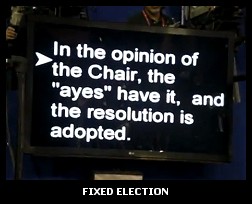3-judge panel finds law discriminatory under Voting Rights Act, would 'disenfranchise minorities and the poor'...
 Following on the U.S. Dept. of Justice finding last March that the Republican-enacted polling place Photo ID restriction law in Texas was discriminatory, in violation of the U.S. Voting Rights Act (VRA), a three-judge U.S. District Court panel has again blocked the law from being implemented.
Following on the U.S. Dept. of Justice finding last March that the Republican-enacted polling place Photo ID restriction law in Texas was discriminatory, in violation of the U.S. Voting Rights Act (VRA), a three-judge U.S. District Court panel has again blocked the law from being implemented.
The decision by the federal panel, which included one judge appointed by George W. Bush, was unanimous.
Texas had appealed the DoJ decision earlier this year, seeking a declaratory judgment from the court, after the federal agency had found the state had not met its "burden of showing that a submitted change [to an election law] has neither a discriminatory purpose nor a discriminatory effect," under Section 5 of the VRA, which requires preclearance for new election laws in 16 different U.S. jurisdictions with a history of racial discrimination. The Lone Star State is one of those jurisdictions.
The DoJ had determined [PDF] that, based on the state's own statistics, the law would have disproportionately disenfranchised registered Hispanic voters in the state. They found that registered Hispanics are anywhere from 46% to 120% more likely than non-Hispanics to lack the type of state-issued Photo ID that would have now been required to vote under the new law.
The 56-page ruling by the U.S. District court panel in D.C. today [PDF] found that "the law will almost certainly have retrogressive effect" as "it imposes strict, unforgiving burdens on the poor, and racial minorities in Texas [who] are disproportionately likely to live in poverty."
"Crucially," the court added, "the Texas legislature defeated several amendments that could have made this a far closer case" when they ignored warnings that the law "as written, would disenfranchise minorities and the poor."
In Texas, as Democratic lawmakers had pointed out while the bill was being debated, some registered voters would have to travel as far as 250 miles round trip to receive their "free" ID from a state Dept. of Public Safety (DPS) driver's license facility, presuming they owned or were able to afford buy the underlying documentation required to obtain that "free" ID. The burden would be especially difficult for those without drivers licenses in the first place. Moreover, as the DoJ had previously found, "in 81 of the state’s 254 counties, there are no operational driver’s license offices," and many of them have limited hours of operation.
The court blasted both the Republican lawmakers and the attorneys who presented their case. "Everything Texas has submitted as affirmative evidence is unpersuasive, invalid, or both. Moreover, uncontested record evidence conclusively shows that the implicit costs of obtaining [Photo ID that would satisfy the new law] will fall most heavily on the poor and that a disproportionately high percentage of African Americans and Hispanics in Texas live in poverty. We therefore conclude that SB 14 is likely to lead to 'retrogression in the position of racial minorities with respect to their effective exercise of the electoral franchise.'"
This was the second stinging loss for Texas Republicans in one week. On Monday, their plan for Congressional Redistricting in the state, on the heels of four new seats gained after the 2010 Census, was also struck down by a three-judge federal panel for violations of the VRA...
--- Click here for REST OF STORY!... ---
 This is amusing and/or interesting and/or not surprising at all on several levels.
This is amusing and/or interesting and/or not surprising at all on several levels.

 Blowing Smoke.
Blowing Smoke. 'Green News Report' 5/6/25
'Green News Report' 5/6/25
 SCOTUS Allowing Publicly-Funded Religious Schools 'Would be a Ground-Breaking Disaster': 'BradCast' 5/7/25
SCOTUS Allowing Publicly-Funded Religious Schools 'Would be a Ground-Breaking Disaster': 'BradCast' 5/7/25 Trump Judge Blocks NC GOP Attempt to Steal 2024 State Supreme Court Election: 'BradCast' 5/6/25
Trump Judge Blocks NC GOP Attempt to Steal 2024 State Supreme Court Election: 'BradCast' 5/6/25 Prosecutors Resign After Trump U.S. Attny Strikes Deal With Felon Cop: 'BradCast' 5/5/25
Prosecutors Resign After Trump U.S. Attny Strikes Deal With Felon Cop: 'BradCast' 5/5/25 Sunday 'Good Buy, Dolly!' Toons
Sunday 'Good Buy, Dolly!' Toons Trump Losing Streak Continues into SECOND Hundred Days: 'BradCast' 5/1/25
Trump Losing Streak Continues into SECOND Hundred Days: 'BradCast' 5/1/25 'Green News Report' 5/1/25
'Green News Report' 5/1/25 100 Daze: 'BradCast' 4/30/25
100 Daze: 'BradCast' 4/30/25 Campaign to 'Impeach Trump Again' Gains Fresh Momentum: 'BradCast' 4/29/25
Campaign to 'Impeach Trump Again' Gains Fresh Momentum: 'BradCast' 4/29/25 'Green News Report' 4/29/25
'Green News Report' 4/29/25 And Then They Came for the Judges...: 'BradCast' 4/28/25
And Then They Came for the Judges...: 'BradCast' 4/28/25 Sunday 'Desperation' Toons
Sunday 'Desperation' Toons Trump EPA Guts Enviro Justice Office: 'BradCast' 4/24/25
Trump EPA Guts Enviro Justice Office: 'BradCast' 4/24/25 'Green News Report' 4/24/25
'Green News Report' 4/24/25 Sunday
Sunday  Largest U.S. Broad-caster Hoaxes Viewers to Help Gut FCC Rules: 'BradCast' 4/23/25
Largest U.S. Broad-caster Hoaxes Viewers to Help Gut FCC Rules: 'BradCast' 4/23/25 FCC on Precipice of Ending All Limits on Corp. Control of Local TV Stations
FCC on Precipice of Ending All Limits on Corp. Control of Local TV Stations GOP Earth Day 2025 Hypocrisies and Dilemmas: 'BradCast' 4/22/25
GOP Earth Day 2025 Hypocrisies and Dilemmas: 'BradCast' 4/22/25 Pope Francis Dies, Trump Still Alive and Criming: 'BradCast' 4/21/25
Pope Francis Dies, Trump Still Alive and Criming: 'BradCast' 4/21/25 Soc. Sec. Expert Warns DOGE of Collapse, Privatization: 'BradCast' 4/10/2025
Soc. Sec. Expert Warns DOGE of Collapse, Privatization: 'BradCast' 4/10/2025 Trump Blinks, Chaos Reigns, Markets Spike Amid Tariff 'Pause': 'BradCast' 4/9/25
Trump Blinks, Chaos Reigns, Markets Spike Amid Tariff 'Pause': 'BradCast' 4/9/25 SCOTUS Deportation Ruling Grimmer Than First Appears: 'BradCast' 4/8/25
SCOTUS Deportation Ruling Grimmer Than First Appears: 'BradCast' 4/8/25 Cliff Diving with Donald: 'BradCast' 4/7/25
Cliff Diving with Donald: 'BradCast' 4/7/25
 VA GOP VOTER REG FRAUDSTER OFF HOOK
VA GOP VOTER REG FRAUDSTER OFF HOOK Criminal GOP Voter Registration Fraud Probe Expanding in VA
Criminal GOP Voter Registration Fraud Probe Expanding in VA DOJ PROBE SOUGHT AFTER VA ARREST
DOJ PROBE SOUGHT AFTER VA ARREST Arrest in VA: GOP Voter Reg Scandal Widens
Arrest in VA: GOP Voter Reg Scandal Widens ALL TOGETHER: ROVE, SPROUL, KOCHS, RNC
ALL TOGETHER: ROVE, SPROUL, KOCHS, RNC LATimes: RNC's 'Fired' Sproul Working for Repubs in 'as Many as 30 States'
LATimes: RNC's 'Fired' Sproul Working for Repubs in 'as Many as 30 States' 'Fired' Sproul Group 'Cloned', Still Working for Republicans in At Least 10 States
'Fired' Sproul Group 'Cloned', Still Working for Republicans in At Least 10 States FINALLY: FOX ON GOP REG FRAUD SCANDAL
FINALLY: FOX ON GOP REG FRAUD SCANDAL COLORADO FOLLOWS FLORIDA WITH GOP CRIMINAL INVESTIGATION
COLORADO FOLLOWS FLORIDA WITH GOP CRIMINAL INVESTIGATION CRIMINAL PROBE LAUNCHED INTO GOP VOTER REGISTRATION FRAUD SCANDAL IN FL
CRIMINAL PROBE LAUNCHED INTO GOP VOTER REGISTRATION FRAUD SCANDAL IN FL Brad Breaks PA Photo ID & GOP Registration Fraud Scandal News on Hartmann TV
Brad Breaks PA Photo ID & GOP Registration Fraud Scandal News on Hartmann TV  CAUGHT ON TAPE: COORDINATED NATIONWIDE GOP VOTER REG SCAM
CAUGHT ON TAPE: COORDINATED NATIONWIDE GOP VOTER REG SCAM CRIMINAL ELECTION FRAUD COMPLAINT FILED AGAINST GOP 'FRAUD' FIRM
CRIMINAL ELECTION FRAUD COMPLAINT FILED AGAINST GOP 'FRAUD' FIRM RICK SCOTT GETS ROLLED IN GOP REGISTRATION FRAUD SCANDAL
RICK SCOTT GETS ROLLED IN GOP REGISTRATION FRAUD SCANDAL VIDEO: Brad Breaks GOP Reg Fraud Scandal on Hartmann TV
VIDEO: Brad Breaks GOP Reg Fraud Scandal on Hartmann TV RNC FIRES NATIONAL VOTER REGISTRATION FIRM FOR FRAUD
RNC FIRES NATIONAL VOTER REGISTRATION FIRM FOR FRAUD EXCLUSIVE: Intvw w/ FL Official Who First Discovered GOP Reg Fraud
EXCLUSIVE: Intvw w/ FL Official Who First Discovered GOP Reg Fraud GOP REGISTRATION FRAUD FOUND IN FL
GOP REGISTRATION FRAUD FOUND IN FL



















 Following on the
Following on the  The insults have been piling up all year, as the establishment GOP has been kicking its own to the curb in primary after primary, caucus after caucus, convention after convention.
The insults have been piling up all year, as the establishment GOP has been kicking its own to the curb in primary after primary, caucus after caucus, convention after convention. Apparently, they never learn. Or they just don't care.
Apparently, they never learn. Or they just don't care.
 Otherwise valid provisional ballots cast at the wrong precincts in Ohio, through no fault of the voters, must be counted, according to a
Otherwise valid provisional ballots cast at the wrong precincts in Ohio, through no fault of the voters, must be counted, according to a 
 Late last week,
Late last week,  Another day, another allegation of voter fraud by Republicans. This one,
Another day, another allegation of voter fraud by Republicans. This one, 
 With the partisanship heating up in the battle for voting rights in Ohio again this year --- as Republican Sec. of State John Husted actually
With the partisanship heating up in the battle for voting rights in Ohio again this year --- as Republican Sec. of State John Husted actually  Pennsylvania has refused to turn over documents that the U.S. Department of Justice (DoJ) had sought in order to determine whether the state's new polling place Photo ID restriction law is in violation of Section 2 of the Voting Rights Act (VRA) and other federal laws.
Pennsylvania has refused to turn over documents that the U.S. Department of Justice (DoJ) had sought in order to determine whether the state's new polling place Photo ID restriction law is in violation of Section 2 of the Voting Rights Act (VRA) and other federal laws. 
 As with their
As with their  Longtime readers of
Longtime readers of 












